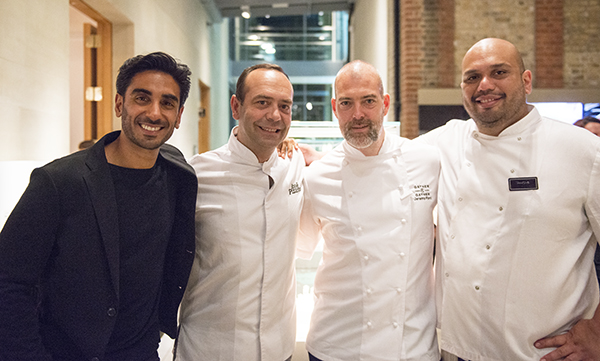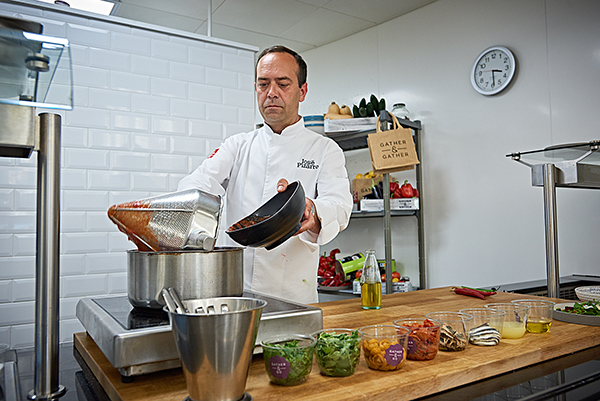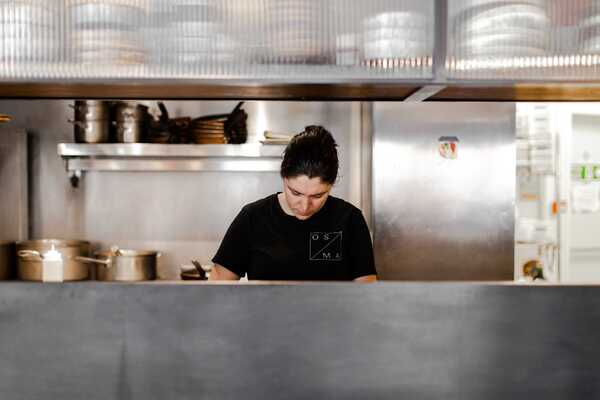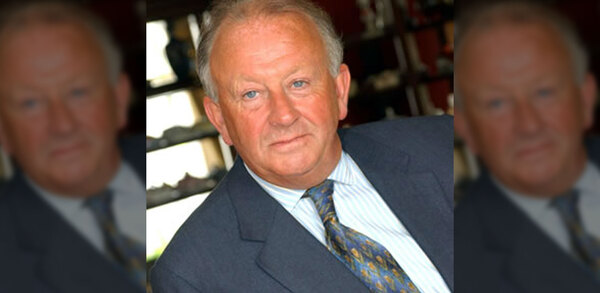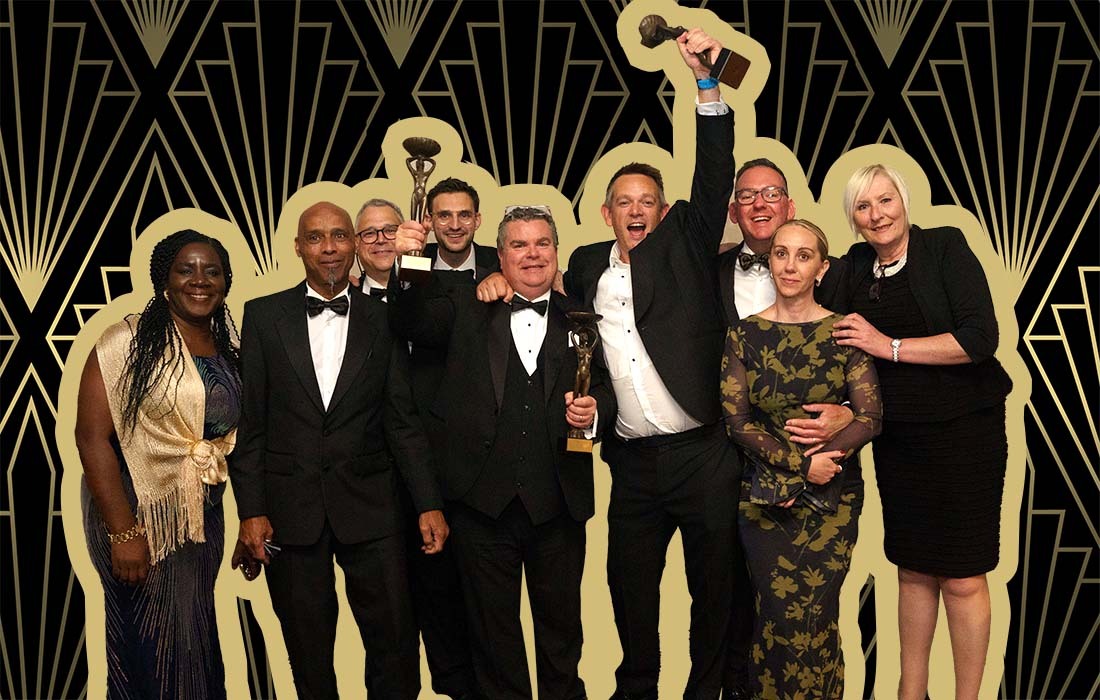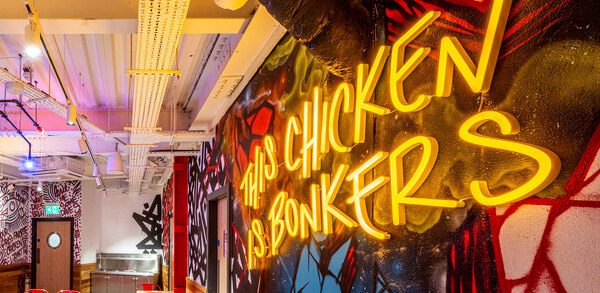A meeting of minds: Why Gather & Gather is collaborating with industry experts
Five years after Mitie Group's catering arm transformed into Gather & Gather, the catering company has its eye on the next chapter, collaborating with chefs and industry specialists to create Gather & Gather 2.0, its expert-led approach to workplace dining. Managing director Allister Richards explains all to Janie Manzoori-Stamford
"We're not going to create a rule book and say this is the way we do business," says Allister Richards. "We want a much more flexible and innovative model."
In the 12-month run-up to Gather & Gatherâs launch in late spring 2013, annual turnover had already soared from £35.5m to £64.1m after remaining largely flat, thanks to a handful of bundled service deals with Mitie as well as the acquisition of 51% of exhibition and events caterer Creativevents (the balance was bought in 2015). The rebrand then saw this momentum continue by successfully amplifying the companyâs standalone catering offer and firm food focus.
And for a corporate-owned entity, there was an unexpected level of charm and whimsy. For example, the company bought cricketer Freddie Flintoffâs fish and chip van for a âgiggleâ and installed it on a client site, while an ex-MOD service Land Rover called Larry was kitted out with a coffee-maker and wood-fired pizza oven as a roving pop-up offer.
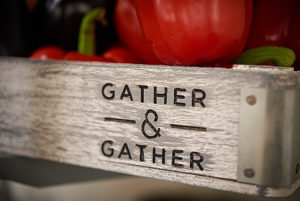
But as the turbulence in the Mitie engine room was felt by Gather & Gather, so too was a fresh burst of momentum from new group chief executive Phil Bentley. It is one reason why, five years after launch, Richards is spearheading the next chapter for the business, dubbed Gather & Gather 2.0.
Fresh talent
âWith all the energy going into running Mitie under a new chief executive and leadership team, weâve needed to say, whatâs our response? How are we coming back to life and putting fresh growth impetus back in?â
This impetus is already beginning to show in the numbers. The caterer reported growth of £4.9m to £102.2m in the year ended March 2017 and that 5% year-on-year increase is expected to hit double figures for the current financial year. So how has this fresh energy been achieved? In the first instance, it has come from the team. As key players involved in the first phase of Gather & Gather have moved on to their next challenge, there has been an injection of fresh talent.
Michael Namock, who previously worked at Lexington, Elior and Nomad Food Design, was an internal promotion to sales director. Alexandra Kristall came on board as regional operations director with three yearsâ experience spent looking after Google for Compass Groupâs Restaurant Associates (RA) under her belt. And perhaps the most high-profile appointment was Jeremy Ford, who worked his way up to culinary director of RA over the course of 21 years with Compass, before joining team Gather & Gather as director of food.
Ford, who joined in April this year, has fast made an impact by being a key player in the launch of one of the catererâs newest initiatives, the Gathered Table. Chefs Ollie Dabbous, José Pizarro, JP McMahon and Neil Rankin are among a 12-strong team that includes nutrition experts, sustainability champions, tech pioneers and suppliers [see âWho sits at the Gathered Table? below] with the aim of creating a âunique collaboration in workplace diningâ. Caterers teaming up with chefs is nothing new, of course, but why has Gather & Gather teamed up with so many?
âWe wanted to do something that felt broader than one relationship and where some of the people we work with were challengers in the world of restaurants and hospitality. Ollie is a case in point. He is very innovative and thereâs something a bit rock ânâ roll about him, but heâs very intelligent and really nice to do business with. Also, the brand was set up to have the potential for collaboration. Thatâs what the âGather andâ bit was designed to be.â
The Gathered Table, which is designed to adapt and evolve as collaborators come and go, creates a point of difference for the company when it comes to attracting new business. At the same time, it generates valuable engagement with the catererâs own chefs.
âTheyâre not getting access to just one admittedly incredible two-star stage that teaches them techniques they wonât use week in, week out. Theyâve got eight different cuisines and styles to learn from,â says Richards.
âThey could be at Neil Rankinâs learning to cook over open fire one day and the next they could be doing something refined with Ollie Dabbous at Hide. Those experiences give our chefs money-canât-buy access to amazing talent.â
The Gathered Table is the latest example of Gather & Gather striving to carve its own niche within an increasingly consolidated food- service industry, and itâs easy to see why. The sectorâs big players are Compass Group, Sodexo, Aramark, Elior, WSH and CH&Co; ISS is the only direct facilities management (FM)competitor; and independents such as Bartlett Mitchell, Vacherin and Genuine Dining Co are doing good things, says Richards, but there arenât as many as there were.
âOur view is that from a scale perspective we donât belong in that independent piece â" weâve never claimed to be independent. And weâve never really competed on standalone catering deals against ISS because emotionally weâre a completely different sell. We compete on integrated FM deals with ISS and to an extent with Sodexo and Compass, but if itâs a self-delivered multinational total FM contract, these companies have flags in 80 countries,â he explains.
âOne of the reasons for Gather & Gather 2.0 and the rearticulation of the business is there is no point having a sub-scaled version of Compass and Sodexoâs culture and business model when weâll never compete on scale and weâll always lose on multinational capability.â
And that seems to be the rub: communicating the companyâs message. New initiatives aside, Gather & Gather is doing what it has always done. The right systems and processes were always in place, as was everything needed to bag five out of five on a tender-scoring matrix, explains Richards.
âWe were more keen on the whimsical, romantic story than we were on telling the tangible, matrix-scoring story,â he says. âIt wasnât that we didnât do it. You canât run a business and employ 3,000 people and not do it, because otherwise youâre not safe. But we just didnât enjoy telling that story.â
This realisation was made crystal clear during a debrief with a client as to why Gather & Gather had won a piece of business, when Richards was told the company was âjust a bit more Shoreditch than the competitionâ. It was undoubtedly meant as a compliment that in many ways rings true, but it also sparked concern. Was the perception of Gather & Gather in the marketplace taking account of everything the company has to offer?
âI laughed because weâve been to Shoreditch but thatâs about as close as it gets. Weâve never wanted to be the dad dancing at the disco about this and that made me worried. While it was really nice to hear, it felt like we were wearing someone elseâs clothes. I want there to be other reasons to award us a contract.â
A changing market
That said, there remains a concerted effort to deliver a point of difference â" fresh ideas, entrepreneurial spirit and flexibility â" that Richards says clients and consultants are crying out for, with the general message being that things are getting a bit vanilla.
âThat doesnât mean that there arenât people doing brilliant things,â he adds. âBut the market is moving and I donât think anyone can legitimately say they know where itâs going to land because of whatâs happening with workplaces. Agile working, delivery models, wellbeing⦠these are all massive, strong themes but no one knows what the workplace will look like in 10 yearsâ time. So people are looking for ideas and innovation.â
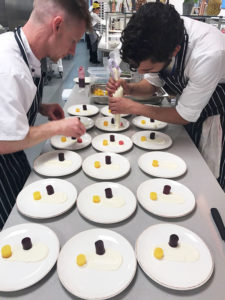
But Richards remains pragmatic: âWe havenât got the rent and rates double whammy that the high street has. So OK, itâs tough â" it will be tough for a few years. But if you work in this industry, thatâs broadly the reality at the moment. Weâve got to be disciplined in the way we operate.â
Gather & Gather 2.0 has already got off to a flying start. The company has bagged âa good slugâ, or £20m, of business since April. It is beginning to see the benefit of its standalone engagement with the market during its parent companyâs recent tough times, while Mitieâs return to form is generating more opportunities to be part of TFM bids. And being able to satisfy cyclical client demands as they move from single to bundled services and back again sets the company in good stead.
Yet despite all of Gather & Gatherâs efforts to establish its credentials as a standalone catering force to be reckoned with, there remains some potential clients that canât see past the association with Mitie and the unsexy connotations of cleaning and maintenance that it conjures up. So is that frustrating?
âI look at it the other way,â says Richards. âWe often find ourselves in facilitated conversations with clients that we wouldnât otherwise get on our own. There are benefits to being part of the group. As long as the group is operating well, if itâs got its mojo and its reputation is strong, thereâs far more value in the associations you can form.â
Who sits at the Gathered Table?
⢠José Pizarro, chef-owner, José and Pizarro, London
â¢Â JP McMahon, head chef and owner, Aniar, Tartare and Cava Bodega, Galway
â¢Â Michael Rolph, co-founder and chief executive, Yoyo
â¢Â Neil Rankin, chef-owner, Temper, London
â¢Â Ollie Dabbous, head chef and collaborator, Hide, London
â¢Â Ramael Scully, head chef and co-owner, Scully, St Jamesâs, London
â¢Â Sabrina Ghayour, chef and food writer
⢠Sustainable Restaurant Association
â¢Â Jeremy Torz and Steven Macatonia, founders, Union Hand-Roasted Coffee
â¢Â Nisha Katona, founder, Mowgli Street Food
â¢Â Dr Rupy Aujla, NHS GP and founder of the Doctorâs Kitchen
About Gather & Gather
Annual turnover £102.2m by March 2018
Number of staff 3,000
Number of sites 300 across the UK and Ireland
Daily customers 700,000
Key contracts Gather & Gather: Vodafone, Ford, Sky, Rolls-Royce, Lloyds Banking Group and DropBox. Creativeevents: RHS Chelsea Flower Show and Dulwich Picture Gallery
Gather & Gather launches collaboration with Pizarro, McMahon, Rankin and more >>



